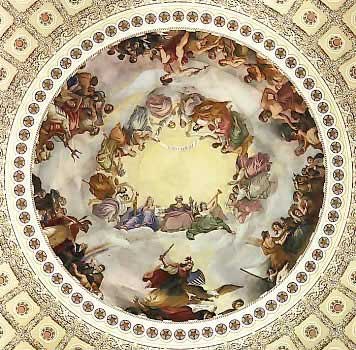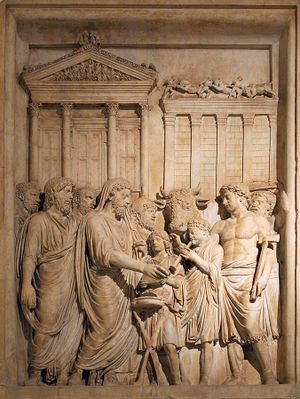Emperator: Difference between revisions
No edit summary |
No edit summary |
||
| Line 1: | Line 1: | ||
== Emperator == | |||
Emperator commander (a title conferred under the Republic on a victorious general and under the Empire on the emperor). | Emperator commander (a title conferred under the Republic on a victorious general and under the Empire on the emperor). | ||
Revision as of 19:04, 16 December 2015
Emperator
Emperator commander (a title conferred under the Republic on a victorious general and under the Empire on the emperor).
Latin, from imperare ‘to order, command.’
The office of Commander in Chief of the Roman Army and navy.
From Rome vs US
There are many things we should understand about Rome in order to understand the governments of today. In 29 B.C. Gaius Octavianus marched into Rome as the “savior of the Republic” and was given the title of Augustus by the Senate. He was then legally granted, under constitutional forms and limitations, the position Emperator.[1] This was one of three offices established to protect the Republic.
Offices of Rome
Emperator
- “Protection draws to it subjection; subjection protection” [2]
The Emperator was ‘commander in chief’ of all military and naval forces, for a period of ten years. He could set foreign policy and establish treaties much as the president of the United States does today.
President
The Principas Civitas, was the ‘First Citizen’ or chief executive officer of Rome, a municipality. At home each year he had to be elected to office, swearing a binding oath read from clay tablets.
- “Thus the republic was restored under the presidency of its ‘first citizen’.”[3]
A republic under an authority that is no longer titular is no longer a pure Republic.
The United States is another government within that Republic but the people have left that Republic and entered into the Democracy. The more the people fail to retain their rights under God the more they remove themselves from the republic and go under the gods many of the world.

Apotheosis
The third office Augustus requested from the Senate was the most interesting and misunderstood. It was the office of God. Actually, he was not just a god, but the ApoTheos, or Originator of gods.
His duties as the originator of gods was to appoint all the lesser gods throughout the empire. These gods were called theos in the Greek. The New Testament translates the word theos into the word gods or God.
From Mark of the Beast
Family values were a chief topic of political rhetoric before every election and during the writing of the new constitution by Augustus. The rise of that Empire out of the ashes of a free republic was unrelenting.
After their civil war, the first of the three offices sought by Augustus was Emperator,[4]commander in chief of the army and naval forces. The second office was Principas Civitas, the First Citizen, the chief executive officer or President of Rome,[5] a municipality. The third office was ApoTheos, literally translated the appointor of gods.
The duties of this office were to appoint all the judges or magistrates for the empirical courts. Each office required an oath based on constitutional restrictions. Successors were determined by an electoral college of the Senate, known as the “Conscripted Fathers.” [6]
From Judge
This apotheosis[7] of presidents was fundamentally no different than the deification of Caesar as god who was also the commander in chief of the military[8] and chief executive officer[9] of the world[10] order of Rome. History does repeat itself if we will not learn from it and if they are going to change our understanding of words we may all be deceived again.<Ref>2 Timothy 3:13 But evil men and seducers shall wax worse and worse, deceiving, and being deceived.
From Imperial Cult of Rome

The Imperial cult of ancient Rome identified emperors and some members of their families with the divinely sanctioned authority of the Roman State.
Government |
Governments |
Civil Government |
Government and Liberty Described |
Social contract |
Covenants of the gods |
Contracts, Covenants and Constitutions |
Nationalism |
Republic |
Democracy |
Minarchism |
Statism |
Fascism |
Tyranny |
Despotism |
Federation
Communism |
Anarcho communism |
Communist Manifesto |
Communist Altruism |
Primitive Communism |
Karl Marx Marriage |
Collectivism |
Altruism |
Saul Syndrome |
Foolishly |
Anarchist |
Capitalism |
Socialism |
Rules For Radicals |
Atheist |
Viable republic |
Republican form |
Titular |
The Way |
Perfect law of liberty |
NAP |
Taxation |
Tribute |
Tithe |
Tithing |
Pay tribute |
Legal charity |
Social Security |
Corban |
Hierarchy |
Imperial Cult of Rome |
The Democracy Cult |
Employ |
Bondage |
Mammon |
Temples |
Cain |
Nimrod |
Pharaoh |
Caesar |
Law |
Mystery Babylon |
Saving Babylon |
Exiting Babylon |
Supreme being |
gods many |
Ideological subversion |
Schools as Tools |
Roots of the Welfare State |
Covetous Practices |
Consent not |
Withdraw consent |
Come out |
Put out |
Cry out |
Voice |
Kingdom of God |
Church legally defined |
Pure Religion |
Christian conflict |
Religion |
Pure Religion |
Private welfare |
Fleeing Religion |
False religion |
Public religion |
Our Religion |
Christian conflict |
Corban |
Baptism |
Benefactors |
That Word |
Daily ministration |
Modern Christians |
Diocletianic Persecution |
Christians check list |
gods |
Judge not |
Judge |
Fathers |
Deist |
Damnable heresies |
Factions at the altar |
Pharisees |
Sadducees |
Zealot |
Essenes |
Levites |
Messianic Judaism |
Menahem the Essene |
Sanhedrin |
Altars |
Clay and Stone |
Red Heifer |
Golden calf |
Freewill offerings |
Religion |
Pure Religion |
Public religion |
Christian conflict |
Paganism |
Denominations |
Dispensationalism |
Benefactors |
Corban |
Daily ministration |
Calendars |
Cult |
Imperial Cult of Rome |
Guru theories| |
Covet |
Merchandise |
Mark of God |
Mark of Cain |
Mark of the Beast |
Nature of the Beast
Section 666 |
Benefactors |
Biting one another |
Cry out |
Worship |
Church |
Temples |
Religious Orders |
Priests |
Kings and priests |
Hear |
Bible Index |
Network |
Socialist
Socialism |
Communism |
Primitive Communism |
Anarcho communism |
Communist Altruism |
Collectivism |
Communitarian |
Community Law |
Crowd psychology |
Statues |
Heroes |
Legal charity |
Riots |
Welfare |
Welfare types |
Public religion |
Corban |
Why Socialism |
Was Jesus a socialist |
Not so Secure Socialism |
covetous practices |
Weightier matters |
Dialectic |
Bread and circuses |
gods |
Deist |
James Scott |
Liberalism |
Classical liberalism |
Transcendentalist |
Polybius |
Plutarch |
Perfect law of liberty |
Perfect savages |
Lady Godiva |
Nimrod |
Cain |
Bondage of Egypt |
Corvee |
Nicolaitan |
Benefactors |
Fathers |
Social bonds |
Citizen |
Social contract |
Section 666 |
Mark of the Beast |
Christian conflict |
Diocletianic Persecution |
Mystery Babylon |
Norway,
Sweden,
Finland, and
Denmark |
Community |
I paid in |
Goats and Sheep |
Shepherds |
Free Keys |
Roots of the Welfare State |
Cloward-Piven Strategy |
Rules For Radicals |
Communist Manifesto |
Live as if the state does not exist |
Departed |
Nazi |
Authority |
Guru theories |
Larken Rose |
Capitalism |
Covet |
Dominionism |
FEMA |
Network
== Footnotes ==
- ↑ Emperator, emperatoris m.commander in chief Collins L.E. Dict. ‘62.
- ↑ Protectio trahit subjectionem, subjectio protectionem. Coke, Littl. 65.
- ↑ Encyclopedia Britanica Vol 2, p. 687, ‘53.
- ↑ Emperator, emperatoris m.commander in chief Collins L.E. Dict. '62.
- ↑
- "Thus the republic was restored under the presidency of its 'first citizen' (princeps civitatis)." (Encyclopedia Brittanica Vol 2, p. 687, '53
- ↑ Rome vs. US http://www.hisholychurch.org/news/articles/romeus.php
- ↑ a·poth·e·o·sis 1. “Exaltation to divine rank or stature; deification.” The American Heritage® Dictionary of the English Language, Fourth Edition copyright ©2000 by Houghton Mifflin Company. “the elevation of a person to the rank of a god; deification” Collins English Dictionary – Complete and Unabridged © HarperCollins Publishers 1991, 1994, 1998, 2000, 2003. 1. the elevation of a person to the rank of a god. Random House Kernerman Webster's College Dictionary, © 2010 K Dictionaries Ltd. Copyright 2005, 1997, 1991 by Random House, Inc.
- ↑ Emperator, emperatoris m.commander in chief Collins L.E. Dict. ‘62. http://www.hisholychurch.org/news/articles/romeus.php#Emperator
- ↑ http://www.hisholychurch.org/news/articles/romeus.php#President
- ↑ http://www.hisholychurch.org/news/articles/world.php
About the author
Subscribe
HELP US at His Holy Church spread the word by SUBSCRIBING to many of our CHANNELS and the Network.
The more subscribers will give us more opportunity to reach out to others and build the network as Christ commanded.
Join the network.
Most important is to become a part of the Living Network which is not dependent upon the internet but seeks to form The bands of a free society.
You can do this by joining the local email group on the network and helping one another in a network of Tens.
His Holy Church - YouTube
https://www.youtube.com/user/hisholychurch
Bitchute channel will often include material that would be censored.
https://www.bitchute.com/channel/o6xa17ZTh2KG/
Rumble Channel gregory144
https://rumble.com/user/gregory144
To read more go to "His Holy Church" (HHC) https://www.hisholychurch.org/
Brother Gregory in the wilderness.
https://www.youtube.com/channel/UCJSw6O7_-vA4dweVpMPEXRA
About the author, Brother Gregory
https://hisholychurch.org/author.php
PreparingU - YouTube
https://www.youtube.com/channel/UC9hTUK8R89ElcXVgUjWoOXQ
Facebook
https://www.facebook.com/HisHolyChurch
